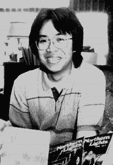|
Please help me!
July 29, 1981
I woke up at seven, which is earlier in the morning than usual.
Perhaps I was a bit nervous. The first thing I did was to call
Bob. He answered the phone and apologized that he had been out
with his wife the previous night. He then told me a little about
the lake. He stressed that the road to it was only paved halfway
and the lake couldn't be reached by any public transportation.
After talking with him over the phone for a few minutes, I realized
that he was unwilling to offer to take me to the lake in his
car. Anyway I said "Thank you" and hung up the phone.
There was no choice but to get to the lake on my own.
Thunder Bay, a city of 100,000 people, didn't look like the
big city I thought it would be. It is mainly divided into two
sectors, North and South, and houses are scattered over a wide
area. Because of the misinformation given to me by the Greyhound
office, I reserved a room at a hotel in Thunder Bay North, which
isn't the center of the city, so I had to take a bus to the South
side.
It was 8:20 a.m. when I arrived at the bus terminal in the
South, which wasn't so far from the city hall. I thought of dropping
in and having a talk with the city mayor, but since there was
an information center nearby, I decided that it was better to
wait until it opened at 8:30.
Finally a young and beautiful Canadian girl drove up in her
car. She worked in the information center. As soon as she opened
the center's door, I went in and pleaded, "Please help me!"
in unsteady English. This was a common strategy of mine as a
way of winning someone else's sympathy. I took Northern Lights
out of my bag along with some pamphlets, maps and everything
I had collected in Japan, placed them on her desk and explained
the reason for my trip to Thunder Bay. I asked if she could find
me a driver who would be willing to take me to the lake. She
answered that there might be a Japanese student at a nearby university
and called the university dormitory. Since I was sitting near
her, I could hear very clearly what she was saying. She thought
of me as someone who couldn't understand English at all, and
that was the reason she was asking for the help of a Japanese
student.
We waited for a return call from the dormitory for quite some
time. It was almost an hour, and I began to feel a little nervous.
Another girl tried to call a different source of help, and she
was successful. They said that they would send a student along
shortly. But again we had to wait for a while. The lady at the
counter was really sorry about the delay and offered me a cup
of coffee, and we became good friends as we talked. Since it
was the day of the marriage of Prince Charles and Princess Diana,
I said, "You look like Diana." This made her smile.
It was 11:30 when a Canadian high school student by the name
of Kevin came into the information center, which meant that I
had been there for almost three hours. I agreed to hire him as
a driver for four Canadian dollars an hour.
Rent a Car or Lend a Car
It was the second time I had rented a car in a foreign country.
The first time was in Malaga, Spain. Myself and two Japanese
friends traveled to Granada, Cordoba, and Sevilla in a rented
car. But on the way to Sevilla, the car broke down, and we were
forced to walk through the desert under the burning sun. Moreover,
we were asked to pay the cost of having the car repaired. We
had to go to the police station twice before the problem was
finally settled.
This time I had trouble even renting a car. Since the office
near the information center had no cars to lend, Kevin and I
went by bus to a national highway along which there were several
rent-a-car offices. But I did not have a credit card with me,
so they wouldn't let us rent a car. They were suspicious that
without proper identification, the renter might try to sell the
car.
We decided to go to the airport where we found five rent-a-car
offices. We tried four times to persuade them unsuccessfully,
but on our fifth attempt we succeeded. They agreed to rent us
a car on the condition I deposit $150 and would not allow Kevin
to drive because he was still under 17 years of age. I agreed
and with a shaky hand put my signature to the agreement.
|
 The car which we rented cost $40
a day. It was one of those big American cars, a Ford. Kevin described
the beautiful spots just off the road, and he urged me to stop
and see them. But my feeling was that I didn't want leave the
car, even for a minute. I could only think of getting to the
lake, and was unwilling to take even the smallest chance with
the car.
The car which we rented cost $40
a day. It was one of those big American cars, a Ford. Kevin described
the beautiful spots just off the road, and he urged me to stop
and see them. But my feeling was that I didn't want leave the
car, even for a minute. I could only think of getting to the
lake, and was unwilling to take even the smallest chance with
the car.